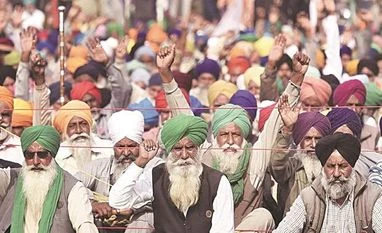Nearly a year after one of the biggest agitations by growers at Delhi’s borders ended with the repeal of the three farm Acts, farmers are once again planning to regroup in the national Capital.
This time the mobilisation will be under the banner of the Bharatiya Kisan Sangh (BKS). It is an affiliate of the Rashtriya Swayamsevak Sangh — the ideological parent of the ruling Bharatiya Janata Party (BJP).
The BKS, which is probably one of the biggest organised groupings of farmers in the country, will place two demands.
One, profitable returns on the production cost and reduction in the goods and services tax (GST) on agriculture inputs — many of which are at the higher 18 per cent band.
Two, a hike in the amount distributed under the Pradhan Mantri Kisan Samman Nidhi (PM-Kisan) in line with increase in inflation on agriculture inputs.
An estimated 100,000 farmers are expected to congregate in the national Capital on December 19, which will have representation from all units in nearly 550 districts of BKS.
The last time BKS organised a major farmer groundswell in the Capital was in 2013 when the Congress-led United Progressive Alliance was in power and the Opposition BJP breathing down its neck on issues of graft and negligence.
That the BKS is planning to coordinate such a big agitation in the Capital at a time when the Narendra Modi-led government at the Centre is on the verge of starting its 2024 re-election campaign is being interpreted in different quarters in myriad ways. The protests might also clash with state elections in Modi’s home state of Gujarat.
“We might have ideological affinity with the ruling BJP, but when it comes to issues related to farmers and the farming community, we are neither with any government nor against any,” Harpal Dagar, Delhi state president of BKS and member of its national executive, told Business Standard.
He said the decision to organise such a big agitation wasn’t spontaneous or driven by any malaise but by issues of remunerative price over cost of production and the abolition of GST on agriculture inputs.
To drum up support, BKS first started marshalling its forces sometime around September 8, 2021, by directing all its state and regional units to send memoranda to the central government listing out a charter of demands.
Thereafter, it held several meetings in Bhopal and Raipur where its national executive passed resolutions to this effect.
At a brainstorming session on October 8-9 in Delhi, its national executive, along with its regional units, decided on the date and venue to hold this protest meet.
“The timing assumes significance because in December most rabi crops have been sown and the wait for harvesting to resume gives farmers ample time to concentrate on other pressing issues,” says Dagar.
Ironically, December was also the month when the farmer agitation at Delhi’s borders by the Samyukta Kisan Morcha gained maximum traction and support from growers in North India, ultimately culminating in a violent uprising on January 26, 2021.
The frontal organisations of the RSS have always termed the agitation as being ‘politically motivated’ — which is why they never came out in open support.
On its part, the BKS, too, claims to be the first association to air its grievances against the now-repealed Acts. On its key demand of ensuring remunerative prices to farmers, key functionaries of the BKS feel that it can be ensured by reducing the cost of production.
“Almost all agriculture universities in the country do a cost of cultivation of the crops that are grown in their regions. This can provide a region-wise cost estimate for all crops because the production cost of paddy of a farmer in Punjab is very different from that of a farmer in West Bengal,” says Dagar.
“We aren’t saying give us 50 per cent over cost. At least give us realistic returns over our production cost,” says another functionary of the organisation. Dagar says the subsidy the Centre gives to fertiliser companies may be directly transferred into the bank accounts of farmers instead of routing it through chemical–based fertiliser companies, giving farmers the option to either purchase organic manure or chemical fertiliser.
“On the one hand, the Centre wants the use of chemical fertilisers brought down. On the other, it spends crores every year on subsidising their sales. Why not give this to farmers?” he asks.
The PM-Kisan platform, observes BKS, is an excellent way to distribute this subsidy directly to farmers.
“We aren’t against the government. What is good for farmers is good for us,” signs off Dagar.
Unlock 30+ premium stories daily hand-picked by our editors, across devices on browser and app.
Pick your favourite companies, get a daily email with all news updates on them.
Full access to our intuitive epaper - clip, save, share articles from any device; newspaper archives from 2006.
Preferential invites to Business Standard events.
Curated newsletters on markets, personal finance, policy & politics, start-ups, technology, and more.



)